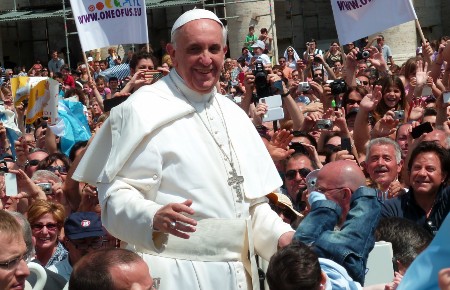We ask you, humbly: don't scroll away.
Hi readers, it seems you use Catholic Online a lot; that's great! It's a little awkward to ask, but we need your help. If you have already donated, we sincerely thank you. We're not salespeople, but we depend on donations averaging $14.76 and fewer than 1% of readers give. If you donate just $5.00, the price of your coffee, Catholic Online School could keep thriving. Thank you.Help Now >
St. Vergilius of Salzburg
FREE Catholic Classes
Irish missionary and astronomer, of the eighth century. Vergilius (or Virgilius, in Irish Fergal, Ferghil , or Feirghil ) is said to have been a descendant of Niall of the Nine Hostages. In the "Annals of the Four Masters" and the "Annals of Ulster" he is mentioned as Abbot of Aghaboe, in Queen's County. About 745 he left Ireland, intending to visit the Holy land, but, like many of his countrymen, who seemed to have adopted this practice as a work of piety, he settled down in France, where he was received with great favour by Pepin, then mayor of the Palace under Childeric III. After spending two years at Cressy, near Compiegne, he went to Bavaria, at the invitation of Duke Otilo, and within a year or two was made Abbot of St. Peter's at Salzburg. Out of humility, he "concealed his orders", and had a bishop named Dobdagrecus, a fellow countryman, appointed to perform his episcopal functions for him. It was while Abbot of St. Peter's that he came into collision with St. Boniface. A priest having, through ignorance, conferred the Sacrament of Baptism using, in place of the correct formula, the words Baptizo te in nomine patria et filia et spiritu sancta", Vergilius held that the sacrament had been validly conferred. Boniface complained to Pope Zachary. The latter, however, decided in favour of Vergilius. Later on, St. Boniface accused Vergilius of teaching a doctrine in regard to the rotundity of the earth, which was "contrary to the Scriptures ". Pope Zachary's decision in this case was that "if it be proved that he held the said doctrine, a council be held, and Vergilius expelled from the Church and deprived of his priestly dignity" (Jaffe, "Biblioth. rerum germ.", III, 191). Unfortunately we no longer possess the treatise in which Vergilius expounded his doctrine. Two things, however, are certain: first, that there was involved the problem of original sin and the universality of redemption ; secondly, that Vergilius succeeded in freeing himself from the charge of teaching a doctrine contrary to Scripture. It is likely that Boniface misunderstood him, taking it for granted, perhaps, that if there are antipodes, the "other race of men" are not descendants of Adam and were not redeemed by Christ. Vergilius, no doubt, had little difficulty in showing that his doctrine did not involve consequences of that kind. (See ANTIPODES.)
After the martyrdom of St. Boniface, Vergilius was made Bishop of Salzburg (766 or 767) and laboured successfully for the upbuilding of his diocese as well as for the spread of the Faith in neighbouring heathen countries, especially in Carinthia. He died at Salzburg, 27 November, 789. In 1233 he was canonized by Gregory IX. His doctrine that the earth is a sphere was derived from the teaching of ancient geographers, and his belief in the existence of the antipodes was probably influenced by the accounts which the ancient Irish voyagers gave of their journeys. This, at least, is the opinion of Rettberg ("Kirchengesch. Deutschlands", II, 236).









 Daily Readings for Friday, April 26, 2024
Daily Readings for Friday, April 26, 2024 St. Cletus: Saint of the Day for Friday, April 26, 2024
St. Cletus: Saint of the Day for Friday, April 26, 2024 Prayer before the Closing of the Day: Prayer of the Day for Friday, April 26, 2024
Prayer before the Closing of the Day: Prayer of the Day for Friday, April 26, 2024

